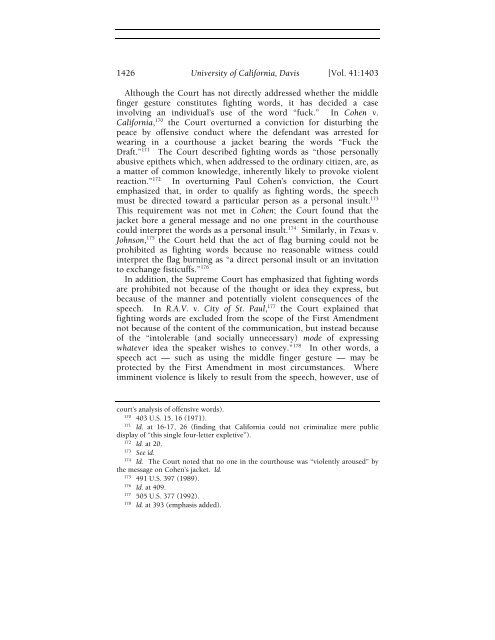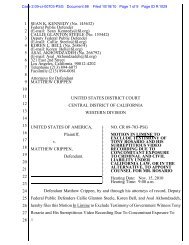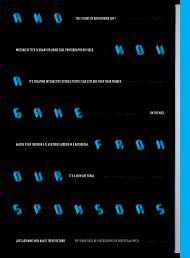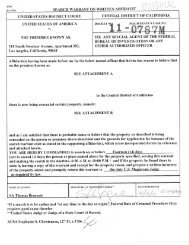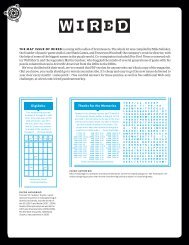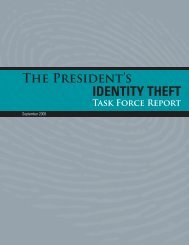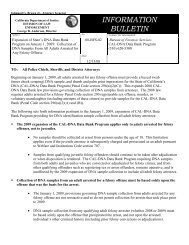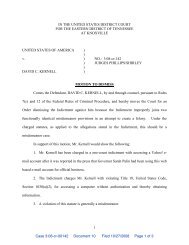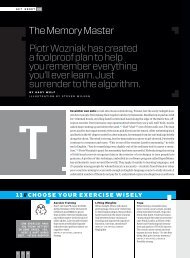Digitus Impudicus: The Middle Finger and the Law - Wired
Digitus Impudicus: The Middle Finger and the Law - Wired
Digitus Impudicus: The Middle Finger and the Law - Wired
Create successful ePaper yourself
Turn your PDF publications into a flip-book with our unique Google optimized e-Paper software.
1426 University of California, Davis [Vol. 41:1403<br />
Although <strong>the</strong> Court has not directly addressed whe<strong>the</strong>r <strong>the</strong> middle<br />
finger gesture constitutes fighting words, it has decided a case<br />
involving an individual’s use of <strong>the</strong> word “fuck.” In Cohen v.<br />
California, 170 <strong>the</strong> Court overturned a conviction for disturbing <strong>the</strong><br />
peace by offensive conduct where <strong>the</strong> defendant was arrested for<br />
wearing in a courthouse a jacket bearing <strong>the</strong> words “Fuck <strong>the</strong><br />
Draft.” 171 <strong>The</strong> Court described fighting words as “those personally<br />
abusive epi<strong>the</strong>ts which, when addressed to <strong>the</strong> ordinary citizen, are, as<br />
a matter of common knowledge, inherently likely to provoke violent<br />
reaction.” 172 In overturning Paul Cohen’s conviction, <strong>the</strong> Court<br />
emphasized that, in order to qualify as fighting words, <strong>the</strong> speech<br />
must be directed toward a particular person as a personal insult. 173<br />
This requirement was not met in Cohen; <strong>the</strong> Court found that <strong>the</strong><br />
jacket bore a general message <strong>and</strong> no one present in <strong>the</strong> courthouse<br />
could interpret <strong>the</strong> words as a personal insult. 174 Similarly, in Texas v.<br />
Johnson, 175 <strong>the</strong> Court held that <strong>the</strong> act of flag burning could not be<br />
prohibited as fighting words because no reasonable witness could<br />
interpret <strong>the</strong> flag burning as “a direct personal insult or an invitation<br />
to exchange fisticuffs.” 176<br />
In addition, <strong>the</strong> Supreme Court has emphasized that fighting words<br />
are prohibited not because of <strong>the</strong> thought or idea <strong>the</strong>y express, but<br />
because of <strong>the</strong> manner <strong>and</strong> potentially violent consequences of <strong>the</strong><br />
speech. In R.A.V. v. City of St. Paul, 177 <strong>the</strong> Court explained that<br />
fighting words are excluded from <strong>the</strong> scope of <strong>the</strong> First Amendment<br />
not because of <strong>the</strong> content of <strong>the</strong> communication, but instead because<br />
of <strong>the</strong> “intolerable (<strong>and</strong> socially unnecessary) mode of expressing<br />
whatever idea <strong>the</strong> speaker wishes to convey.” 178 In o<strong>the</strong>r words, a<br />
speech act — such as using <strong>the</strong> middle finger gesture — may be<br />
protected by <strong>the</strong> First Amendment in most circumstances. Where<br />
imminent violence is likely to result from <strong>the</strong> speech, however, use of<br />
court’s analysis of offensive words).<br />
170 403 U.S. 15, 16 (1971).<br />
171 Id. at 16-17, 26 (finding that California could not criminalize mere public<br />
display of “this single four-letter expletive”).<br />
172 Id. at 20.<br />
173 See id.<br />
174 Id. <strong>The</strong> Court noted that no one in <strong>the</strong> courthouse was “violently aroused” by<br />
<strong>the</strong> message on Cohen’s jacket. Id.<br />
175 491 U.S. 397 (1989).<br />
176 Id. at 409.<br />
177 505 U.S. 377 (1992).<br />
178 Id. at 393 (emphasis added).


